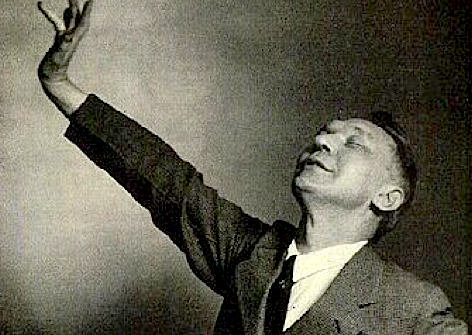The DU Lounge
Related: Culture Forums, Support ForumsBizarre & creepy (Vachel Lindsay reads his poems)
The first time I ever heard a recording of poet Vachel Lyndsey reading one of his poems was about 50 years ago. It freaked me out. Today I found a web page containing more of his poetry readings, and I played them. It freaked me out. (I still have no class.)
First, here’s an intro page about him:
https://jacket2.org/category/commentary-tags/vachel-lindsay
snip (Richard Hyland review of The Congo):

It’s virtually the centennial of Vachel Lindsay’s The Congo (1912, published 1914). But the poem has gone through hard times. Despite its enormous initial popularity, Lindsay’s poem has become an embarrassment. Its overt racist imagery has put it under erasure: little taught and little anthologized. Still, a recitation of the poem appears, without any indication of the controversy, in Peter Weir’s Dead Poets Society. And Lindsay is surely a precursor to a range of performance poetry. PennSound made available a recording of Lindsay reading the poem on our Lindsay page. The Library of America includes the poem in volume one of their great anthology of modernist American poetry (see my 2000 conversation with LOA editor Geoffrey O’Brien). Al Filreis recorded a Poem Talk on the poem — with A.L. Nielsen, Michelle Taransky, and me. Our interest is not to put a happy spin on the poem but rather to see what the poem can tell us about American racsim, including the racism of a poet of the left like Lindsay, who was far more supportive of the rigths of African-Americans than most of his contemporaries.
~~~
The recordings: (W. Cabell Greet made the recordings, but Lindsay was the reader.)
http://writing.upenn.edu/pennsound/x/Lindsay.php
struggle4progress
(118,301 posts)The subtitle "A Study of the Negro Race" doesn't seem very promising, especially when the first section is headed "I. Their Basic Savagery" and begins with stereotypes of "tattooed cannibals" and "a thigh-bone beating on a tin-pan gong"-- but just look what Lindsay says next!
... HOO, HOO, HOO.
Listen to the yell of Leopold's ghost
Burning in Hell for his hand-maimed host.
Hear how the demons chuckle and yell
Cutting his hands off, down in Hell.
Listen to the creepy proclamation,
Blown through the lairs of the forest-nation,
Blown past the white-ants' hill of clay,
Blown past the marsh where the butterflies play:—
"Be careful what you do ...
This is a reference to Belgium's King Leopold II who, beginning in the late 1870s, obtained possession of the Congo and administered it brutally as a private company, producing raw material such as rubber for his own person profit: Leopold's tactics included forced labor of the inhabitants, encouraged by exemplary punishments, such as chopping off the hands of folk (including children) who would not follow orders
One really should ask exactly what Lindsay saying with this transition. You hear the imperialist dismissal of Africans as cattle-thieves, but it is followed by the image of Leopold's armies mutilating the local population to terrorize them into working for Leopold's benefit. Lindsay puts Leopold in hell, but is there really much difference between saying certain behavior will damn you and saying "Mumbo-Jumbo will hoo-doo you"? It is, of course, true that Lindsay is no ethnographer; and it seems to me likely that his views are contaminated by the "white man's burden" notions common to his generation. Still, there is a certain ordinary human sympathy expressed there:
... Coal-black maidens with pearls in their hair,
Knee-skirts trimmed with the jessamine sweet,
And bells on their ankles and little black feet ...
describes (though superficially) a group of young girls as charming as any. Similarly
... And some had visions, as they stood on chairs,
And sang of Jacob, and the golden stairs.
And they all repented, a thousand strong,
From their stupor and savagery and sin and wrong ...
is perhaps simultaneously superficial and authentic; and again one should, in reading the poem, recall Leopold and his thugs, of whom Lindsay never says, they repented "their stupor and savagery and sin and wrong"
Parts of the poem seem racist today; the impression, when it was written nearly a century ago, might have been different
frogmarch
(12,154 posts)I appreciate your post very much, Struggle4progress.
I'd read the poem only once, long ago, and didn't make the Leopold cruelty connection. The words and lines that stood out to me seemed very racist and I was appalled.